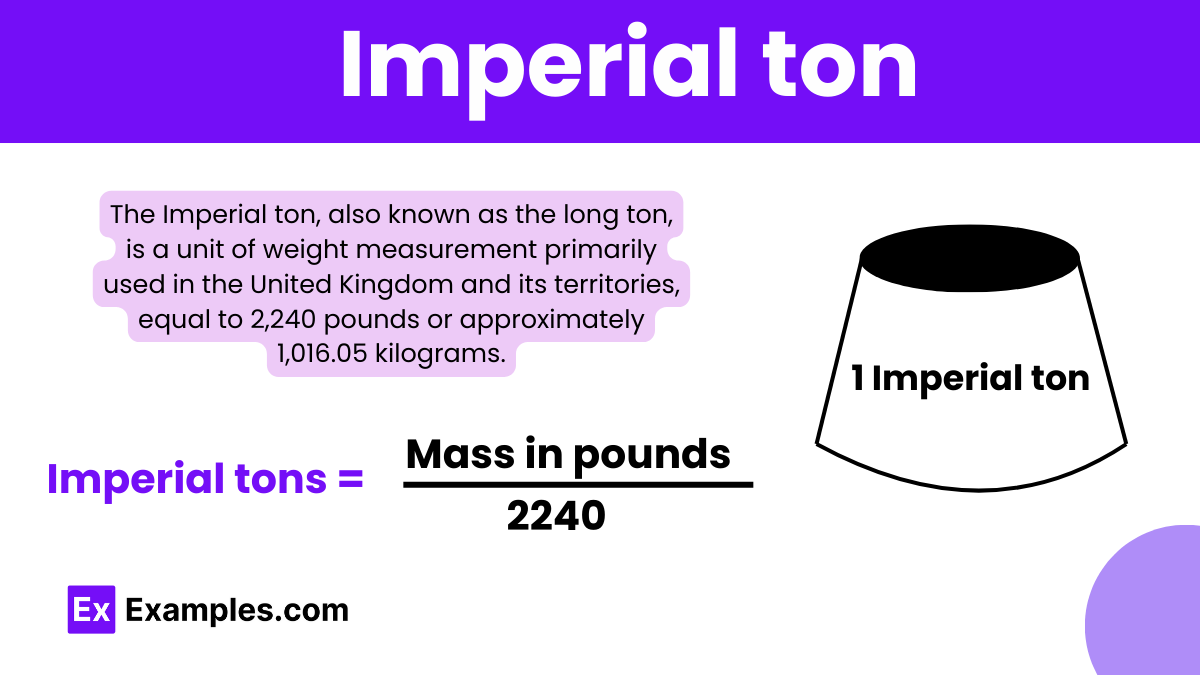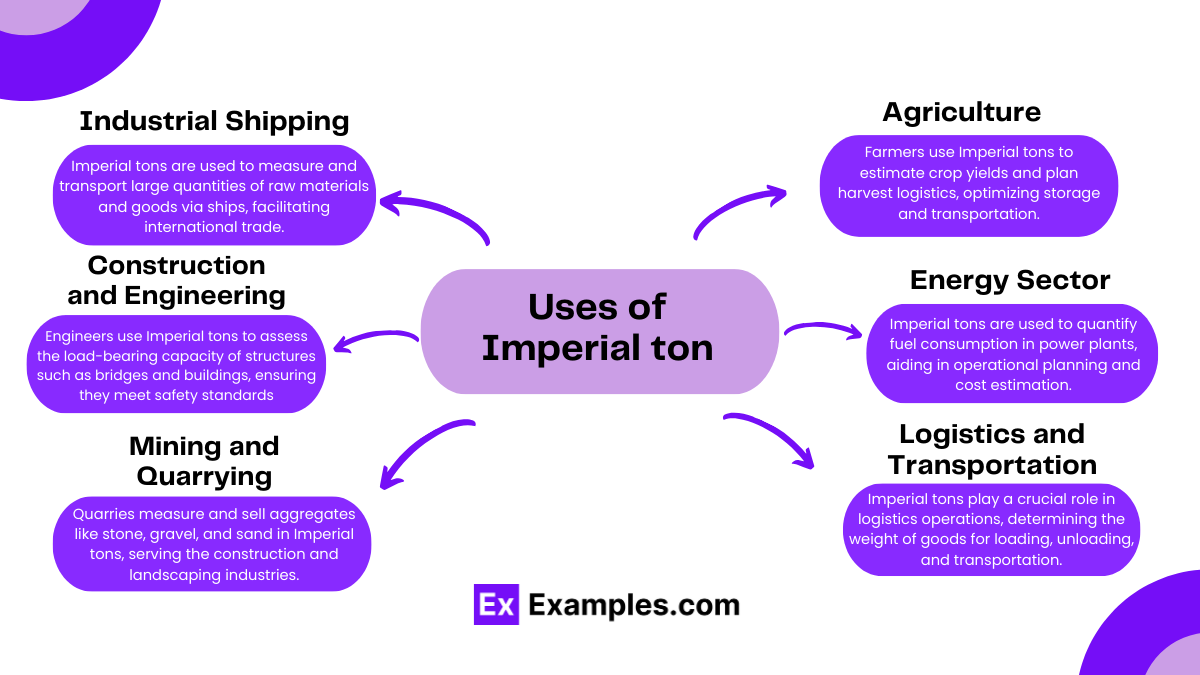How many pounds are there in one imperial ton?
2000 pounds
2200 pounds
2240 pounds
2400 pounds


Let’s say we want to convert 5,000 pounds to Imperial tons.
Using the formula: Imperial tons = Pounds × 0.000446429
Imperial tons = 5000 × 0.000446429
Imperial tons = 2.232145
So, 5,000 pounds is approximately equal to 2.232145 Imperial tons.
| Multiple | Symbol | Prefix | Value |
|---|---|---|---|
| Kilotons | kt | kilo- | 10³ Imperial tons |
| Megatons | Mt | mega- | 10⁶ Imperial tons |
| Gigatons | Gt | giga- | 10⁹ Imperial tons |

| From/To | Conversion Factor | Example |
|---|---|---|
| Imperial ton to Pounds (lbs) | 1 Imperial tons = 2240 lbs | 10 Imperial tons = 22,400 lbs |
| Imperial ton to Kilograms (kg) | 1 Imperial tons = 1016.05 kg | 10 Imperial tons = 10,160.5 kg |
| Imperial ton to Metric Tons (metric tons) | 1 Imperial tons = 1.01605 metric tons | 10 Imperial tons = 10.1605 metric tons |
| Imperial ton to Short Tons (short tons) | 1 Imperial tons = 1.12 short tons | 10 Imperial tons = 11.2 short tons |
| Imperial ton to Stones (stones) | 1 Imperial tons = 160 stones | 10 Imperial tons = 1600 stones |
| Imperial ton to Ounces (ounces) | 1 Imperial tons = 35840 ounces | 10 Imperial tons = 358,400 ounces |
| Imperial ton to Grams (g) | 1 Imperial tons = 1016046.91 g | 10 Imperial tons = 10,160,469.1 g |
| Imperial ton to Carats (carats) | 1 Imperial tons = 5080234.55 carats | 10 Imperial tons = 50,802,345.5 carats |
| Imperial ton to Troy Ounces (ounces) | 1 Imperial tons = 32,000 ounces | 10 Imperial tons = 320,000 troy ounces |
| Imperial ton to Short Hundredweight (short hundredweight) | 1 Imperial tons = 22.4 short hundredweight | 10 Imperial tons = 224 short hundredweight |
Imperial tons serve as a standard unit for measuring large masses in industrial shipping and trade, particularly for bulk commodities like coal, grain, and ore.
In maritime transportation, Imperial tons are used to quantify the mass of cargo loaded onto ships, ensuring efficient vessel loading and safe transport across oceans.
Imperial tons play a vital role in construction projects, where large quantities of materials such as concrete, steel, and aggregates are measured and transported to building sites.
In mining operations, Imperial tons are employed to estimate the quantity of extracted minerals and ores, facilitating resource management and production planning.
Within logistics networks, Imperial tons help streamline inventory management and distribution processes by providing a standardized unit for assessing the weight of goods in transit.
Imperial tons are utilized in the energy sector for measuring coal, oil, and other fuels, supporting operations in power plants and facilitating energy distribution networks.
When evaluating environmental impacts, Imperial tons are used to quantify pollutants, waste materials, and greenhouse gas emissions, aiding regulatory compliance and sustainability initiatives.
Imperial tons are recognized in international standards and regulations governing trade, transportation, and industry, ensuring consistency and compatibility across global markets.
The use of Imperial tons has historical significance, reflecting the legacy of imperial measurement systems and their continued relevance in contemporary industrial practices.
Beyond specific sectors, Imperial tons find application in diverse industries, illustrating their versatility and importance in measuring large masses across various economic activities.
Bulk Cargo Shipping:

The Imperial ton, also known as the long ton, is a unit of mass used in the British imperial system. It is equivalent to 2,240 pounds or approximately 1,016.05 kilograms.
The Imperial ton is commonly used in industries such as shipping, mining, and construction for measuring large masses of materials like coal, ore, and aggregates.
While the Imperial ton is equivalent to 2,240 pounds, it differs from other ton measurements such as the metric ton (1,000 kilograms or approximately 2,204.62 pounds) and the short ton (2,000 pounds).
Text prompt
Add Tone
10 Examples of Public speaking
20 Examples of Gas lighting
How many pounds are there in one imperial ton?
2000 pounds
2200 pounds
2240 pounds
2400 pounds
Which of the following is an imperial ton also known as?
Metric ton
Long ton
Short ton
US ton
Convert 3 imperial tons to pounds.
6720 pounds
6600 pounds
7000 pounds
6800 pounds
What is the metric equivalent of one imperial ton?
1000 kilograms
1016 kilograms
1020 kilograms
1050 kilograms
How many imperial tons are there in 4480 pounds?
1 ton
2 tons
3 tons
4 tons
Which of the following is heavier?
One imperial ton
One short ton
One metric ton
One kiloton
Convert 2.5 imperial tons to kilograms.
2540 kilograms
2500 kilograms
2600 kilograms
2540 kilograms
How many short tons are there in one imperial ton?
0.9 short tons
1.1 short tons
1.12 short tons
1.25 short tons
What is the weight of half an imperial ton in pounds?
1120 pounds
1200 pounds
1100 pounds
1050 pounds
If a truck can carry 10,000 pounds, how many imperial tons can it carry?
4.46 tons
4.48 tons
4.5 tons
4.52 tons
Before you leave, take our quick quiz to enhance your learning!

